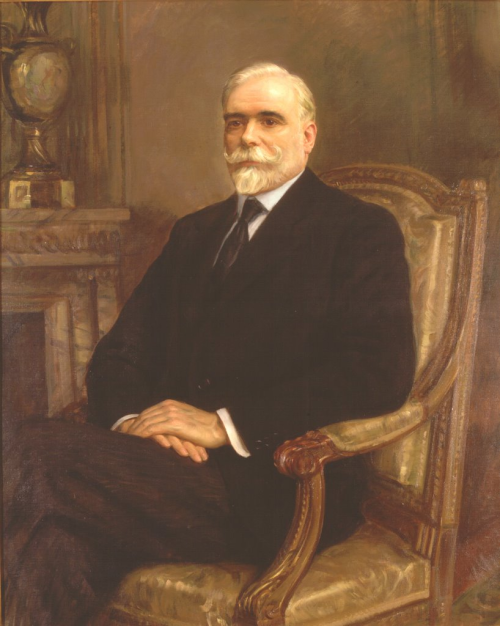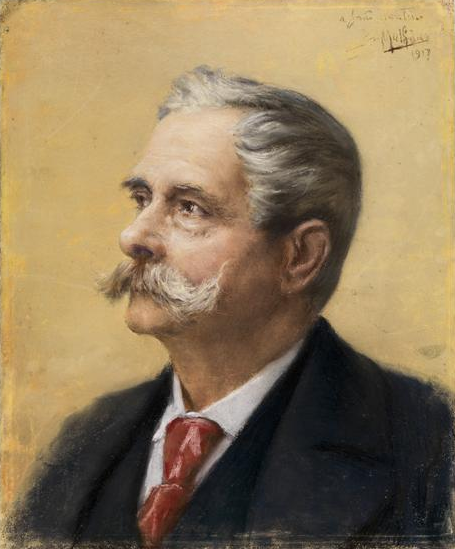#posthumous
Portrait of President António José de Almeida (1866–1929) — Henrique Medina, c. 1932 (Museum of the Presidency of the Republic)
Post link
Portrait of tauromachy promoter Joaquim Pedro Monteiro (1838–1906) — José Malhoa, 1917 (National Museum of Contemporary Art)
Post link
Since exhumations are all the rage right now, I thought I’d share my favorite: Elizabeth Siddal, artist and model to the Pre-Raphaelites.
Siddal died of a laudanum overdose at the age of 32 in 1862 in London. Her husband, Dante Gabriel Rossetti, left a journal containing the only copies of many of his poems in her coffin, tucking it away in her famous red hair.
Howell reported back to Rossetti that she was remarkably well preserved and still beautiful. Whether this was actually true or not, the manuscript didn’t make it out so well preserved. A worm had burrowed through the entire book, leaving behind a big old wormhole.
Image: Siddal as “Ophelia,” by John Everett Millais, 1852, via Wikipedia/Google Art Project.
Post link
Today, we have the privilege of publishing poetry by Wiley Birkhofer. “Boots” is, sadly, being published posthumously. We are lucky that Wiley’s poetry continues to be shared by his friends; not only do their efforts preserve his work - they carry Wiley into the present.
Here is your chance to meet the poet. Here are impressions - anecdotes - descriptions - snapshots - of Wiley Birkhofer. Here are voices of the people who loved (and love) him.
-Wilson Josephson, Assistant Poetry Editor
Leigh Lucas
Wiley Birkhofer—dancer, lover, singer, poet—was a man as much of the body as of the mind. He lived poetry with his body and stuck parts of it to the page. Without his body, we look to his pages more keenly than before, see them more vividly. Wiley’s poetry is as gorgeous as he was—layered, unpredictable, striking, and wild. It’s the kind of poetry that startles you awake and leaves you gasping for air asking yourself, am I crying? No no, I’m laughing. His art lives. He left us with so much and so much wild poetry.
Matthew Rohrer
One of the things I loved about Wiley was how voracious he was with poetry. If I showed him something or suggested something, he’d be back in a day or two having read everything by that person. Having incorporated it like a white blood cell just swarming all over it and making it a part of him.
And he just kept growing and growing.
As an example of his industriousness and his focus, I’m thinking of a reading Joshua Beckman gave at the writer’s house. In typical Beckman style, rather than read from his new book, he unveiled an insanely complicated and unusual new form he’d just invented, and asked people from the audience to come up to the podium to read these new poems. Wiley volunteered right away, and then about halfway through the reading he raised his hand and asked Joshua if he could share one that he’d just written, during the reading.
Wiley brought this voraciousness and total commitment to any project, especially to his thesis, especially right at the end. He wrote poems that looked like upside down trees, or plant roots, or corporate flow charts. That was one poem. You had to answer a question yes or no and go to the stanza that followed. His energy in person was infectious, and his energy on the page is still there, fresh as he was.
Holly Coddington
Wiley Birkhofer:
their penis manly
hanley ramirez
took a fastball to the cock
no longer shaves his forehead with a sponge
(8:18 AM)
Holly Coddington:
he shaves his sponge with a forehead picked off a penis tree
(8:19 AM)
Wiley Birkhofer:
NICE!
you know exactly what i want
turds marinated in corn
bleach from dad’s old shin squeegie
(8:20 AM)
Holly Coddington:
The moon is half-cocked on pubic rope
don’t call me dad
(8:21 AM)
Wiley Birkhofer:
moons
are always good
in poems
the ocean
birds
(8:25 AM)
Holly Coddington:
moons over my hammy
oceans are for drowning pianos in
birds are for flying into windows.
(8:28 AM)
Wiley Birkhofer:
moons are super
birds are basically oceans
okay i gotta go
(8:29 AM)
Holly Coddington:
bye bye
(8:29 AM)
Wiley Birkhofer:
you’re very funny
and imaginative
dirty nasty
(8:29 AM)
Holly Coddington:
haha and you are weird and sweet
and wearing an ego suit
(8:30 AM)
Wiley Birkhofer:
in workshop, rachel told me “you have a very interesting relationship to ego, wiley”
(8:30 AM)
Holly Coddington:
which you unzip and flash us
unzip your ego suit and put your dick on your forehead
(8:31 AM)
Wiley Birkhofer:
i think your analogy is spot on
(8:32 AM)
Friday, March 21, 2014 9:54 AM
Wiley Birkhofer:
i love you
you’re an amazing person
really funny
CGHAT 4 LIFE
(9:54 AM)
Ari King
Ari King: What are you not good at?
Wiley Birkhofer: I’m not good at - this is going to be very psychological - feeling good about myself because of who I am as opposed to which other people like me and things they tell me I’m good at. You know…like I know because my friends are laughing that I am funny not I know that I’m funny because I know that I am funny and I think that I am funny. (Snaps fingers) That’s a really good example!
AK: What are you good at?
WB: Well, I’m really funny. Maybe not in this interview but I’m very light-hearted, I’m very spontaneous, goofy-I hate to use that word-and I care a lot about my friends, I care a lot about the people I met in college, the people I met since. A lot of people are selfish and stuck in their head. I’m stuck in my head but I’m not selfish.
Posthumous (15c), from the Latin postumus, meaning “last,” and originally used to describe a last-born child. In Late Latin, it was influenced by humare, “to bury,” and took on the meaning of “a child born after the death of their father.” Old English had æfterboren (”after-born”) to describe this final meaning.




